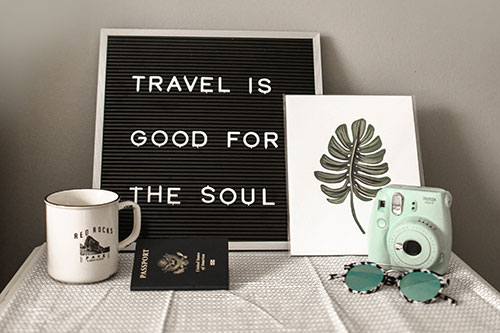
December 16, 2016
By Miriam Kirmayer, PhD Candidate, Therapist
For those of us who love to travel, the days we spend exploring are just about as meaningful and fulfilling as they come. Traveling is a time to disconnect from the daily hassles and stress of work, experience the way other cultures live, try new flavours (a highlight, of course), and, ideally, escape the cold Northeastern winters. It is also becoming increasingly clear that traveling has a number of psychological benefits. Planning ahead and taking that vacation we have been dreaming about can have a positive impact on our well-being, relationships, and maybe even our personality.
We all have an intuitive sense that taking a break or trip can help us feel recharged. The good news is that this feeling is supported by research. Taking a vacation actually does improve our well-being and mood (1-3). In addition to helping us feel happier and more relaxed, traveling can reduce burnout and make us feel like we are better able to handle our jobs when we return (4-6). In addition to improving our mood, taking time off work for a vacation is associated with a number of better physical outcomes, including fewer health complaints and improved sleep (2,4,7).
In most studies, we return to our pre-trip state about 3 to 4 weeks after returning home (2,5). However, even if some of the benefits are short-lived, taking a vacation can really help us cope in times of stress and there are plenty of other reasons why travel is good for our well-being.
Building new connections and strengthening the relationships we already have is a big reason why so many of us are passionate about traveling (8).
For starters, it can sometimes feel much easier to meet, and even approach, new people when we are in a new environment and operating outside of our normal routine and comfort zone. Whether it’s through an organized tour or a chance encounter with a stranger at a café or museum, engaging with fellow travelers or locals can lead to meaningful interactions and even long-lasting friendships. There are also a lot of great apps and resources available for those who are committed to meeting new people while on the road, including Meetup, TravBuddy, and backpackr.
Traveling with our partner or family can also improve our existing relationships. Taking a vacation with our partner or spouse can actually increase our relationship satisfaction (9). Moreover, given that participating in leisure activities as a family can improve feelings of connectedness, it is likely that bringing the kids along can have a positive impact on family functioning (8). At the very least, traveling as a family will no doubt lead to stories and experiences that will be remembered for years to come.
Traveling is also a great way to help us recognize how fortunate we are. Through interacting with different people and ways of life, traveling can help us realize our privilege and all of the things we have to be thankful for. Gratitude has been shown time and time again to help us live happier and healthier lives (10). Reflecting on the differences between the places we visit and our life back home, and being grateful for all that we have, including the means to travel, can help us feel more content. As a bonus, traveling and having the opportunity to meet others from different cultural, linguistic, and socio-economic backgrounds can also help us to be more accepting of diversity and compassionate toward others.
If that’s not enough, research has also shown us that traveling can impact our personality in some pretty interesting and unexpected ways! We know that personality traits, such as openness to new experiences, can influence how likely someone is to seek out travel opportunities. Even more interesting, is that taking an extended trip can actually influence our personality. For example, long-term travel abroad can lead to increases in our openness to experiences, agreeableness (e.g., warm, empathetic, giving), and emotional stability (i.e., easygoing) (11). Oftentimes, the driving force behind these changes are the experiences and interactions we have with others while on the road.
Taken together, traveling can be an exciting and fulfilling experience, especially when we seek out meaningful interactions and connections. That being said, traveling isn’t always in the cards. This is often true during the times when we feel like we need a vacation the most. The good news is that there are things we can do to recreate some of the benefits of a vacation while on a staycation.
Ultimately, regardless of whether it is a staycation or vacation, the key is to try and be mindful and in the moment. It can be tempting to count down the number of days we have left, or to feel pressure to document each moment so that we can share it on social media. The more we can resist these urges and focus on the present, the more likely it is that our vacation will end up being the experience we hoped for. Finally, planning our staycation or trip is a large part of the fun, so remember to enjoy this process too!